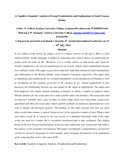A Cognitive Linguistic Analysis of Sexual Dysphemisms and Euphemisms in South Nyanza Dholuo
Abstract
In all cultures of the world, the subject of sex is a major concern in life and is likely to elicit
embarrassment. Sexual language is subject to censoring and a potent source of euphemisms for
people from all walks of life. Therefore, it is a worthy subject of observation and research.
Notably significant is the role of dysphemisms in any society without which euphemisms become
very ordinary words. This paper is part of an empirical study that examined sexual dysphemisms
and euphemisms in the Kenyan Dholuo using Cognitive Linguistics Approach. This paper aims
at identifying and explaining the sex- related dysphemistic words and phrases in Dholuo, as well
as accounting for the cognitive processes in the creation of sex- related euphemisms. It also
discusses the relationship between age and gender in the usage of euphemisms. The study used
both purposive and simple random sampling techniques to obtain a sample of eighteen native
Dholuo speakers for the study (nine were males and the other nine females). The researcher used
an interview schedule and a tape recorder to collect data which was transcribed, categorized,
quantified and then processed after which suitable methods of statistical representations were
used to display the emergent patterns. The findings of this study indicate that men use more
taboo words than women, a typical characteristic of the aggressive nature of men. When a man
uses taboo words, he is viewed by the Luo society as a dignified individual while if the same
words are used by a woman she is considered uncultured and is thus castigated. This finding
brings to the fore the patriarchal nature of the Luo that values men over women and this hinders
the women’s socio-economic development. This paper recommends a comprehensive research be
carried on all native languages in a bid compile native language dictionaries in the attainment
of the cultural pillar in line with vision 2030.

